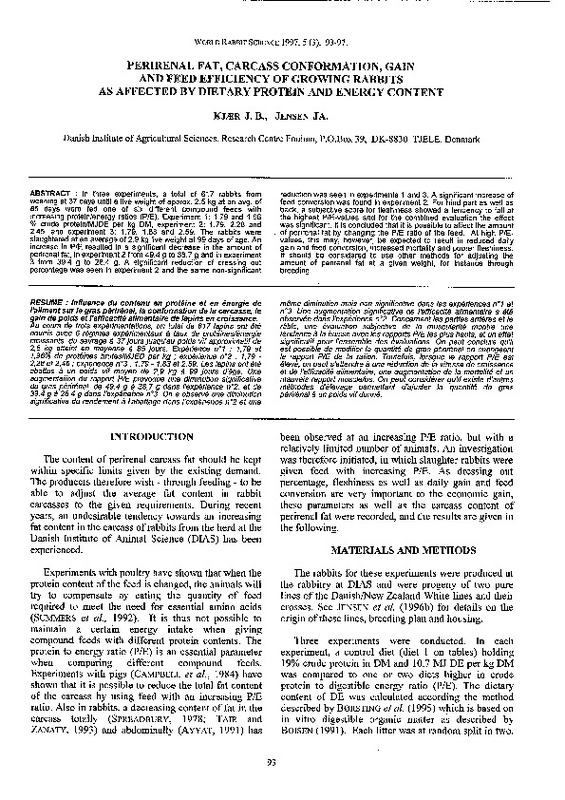|
Resumen:
|
[EN] In three experiments, a total of 617 rabbits from weaning at 37 days until a live weight of approx. 2.5 kg at an avg. of 85 days were fed one of six different compound feeds with increasing protein/energy ratios (P/E). ...[+]
[EN] In three experiments, a total of 617 rabbits from weaning at 37 days until a live weight of approx. 2.5 kg at an avg. of 85 days were fed one of six different compound feeds with increasing protein/energy ratios (P/E). Experiment 1: 1. 79 and 1.96 % crude protein/MJDE per kg DM, experiment 2: 1.79, 2.28 and 2.46, and experiment 3: 1.79, 1.83 and 2.59. The rabbits were slaughtered atan average of 2.9 kg live weight at 99 days of age. An increase in P/E resulted in a significant decrease in the amount of perirenal fat, in experiment 2 from 49.4 g to 38. 7 g and in experiment 3 from 39.4 g to 28.4 g. A significant reduction of dressing out percentage was seen in experiment 2 and the same non-significant reduction was seen in experiments 1 and 3. A significant increase of feed conversion was found in experiment 2. For hind part as well as back, a subjective score for fleshiness showed a tendency to fall at the highest P/E-values and for the combined evaluation the effect was significant. lt is concluded that it is possible to affect the amount of perirenal fat by changing the P/E ratio of the feed. At high P/Evalues, this may, however, be expected to result in reduced daily gain and feed conversion, increased mortality and poorer fleshiness. lt should be considered to use other methods for adjusting the amount of perirenal fat at a given weight, for instance through breeding.
[-]
[FR] Au cours de trois expérimentations, un total de 617 lapins ont été nourris avec 6 régimes expérimentaux á taux de protéineslénergie croissants, du sevrage á 37 jours jusqu'au poids vif approximatif de 2,5 kg atteint ...[+]
[FR] Au cours de trois expérimentations, un total de 617 lapins ont été nourris avec 6 régimes expérimentaux á taux de protéineslénergie croissants, du sevrage á 37 jours jusqu'au poids vif approximatif de 2,5 kg atteint en moyenne a 85 jours. Expérience nº1 : 1,79 et 1,96% de protéines brutes/MJED par kg; expérience nº2: 1,79 -2,28 et 2,46; expérience nº3: 1, 79 - 1,83 et 2,59. Les lapins ont été abattus á un poids vif mayen de 2,9 kg a 99 jours d'age. Une
augmentation du rapport PIE provoque une diminution significative du gras périrénal, de 49,4 g á 38, 7 g dans /'expérience nº2, et de 39,4 g á 28,4 g dans l'expérience nº3. On a observé une diminution significative du rendement á /'abattage dans /'expérience nº2 et une meme diminution mais non significative dans les expériences nº1 et nº3. Une augmentation significative de l'efficacité a/imentaire a été observée dans /'expérience nº2. Concemant les parties anieres et le rabie, une évaluation subjective de la muscularité montre une tendance a la baisse avec les rapports PIE les plus hauts, et un effet significatif pour /'ensemble des évaluations. On peut conc/ure qu'il est possible de modifier la quantité de gras périrénal en changeant le rapport PIE de la ration. Toutefois, lorsque le rapport PIE est é/evé, on peut s'attendre á une réduction de la vitesse de croissance et de l'efficacité alimentaire, une augmentation de la mortalité et un mauvais rapport muse/e/os. On peut considérer qu'il existe d'autres méthodes d'é/evage permettant d'ajuster la quantité de gras périrénal á un poids vif donné.
[-]
|








